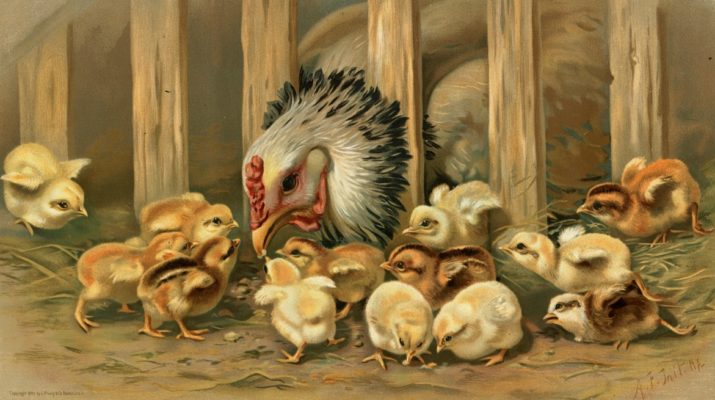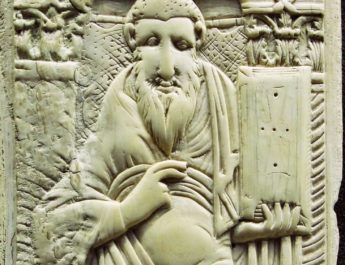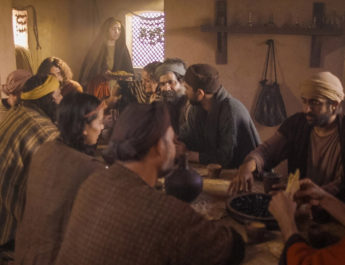Luke 13:1-9, 31-35
Narrative Lectionary 332
1 At that very timeA there were some present who toldB him about the GalileansC
A “time” = kairos. This is season, opportunity, occasion. The word chronos is used for chronological time. Kairos is used for spiritually significant time – the right time or appointed time.
B “told” = apaggello. From apo (from, away from) + aggello (to announce, report); {from aggelos (angel, messenger); probably from ago (to lead, bring, carry, guide, drive)}. This is to report, declare, bring word. It is an announcement that emphasizes the source.
C “Galileans” = Galilaios. 11x in NT. From galilaia (Galilee, the region and the sea); from Hebrew galil (cylinder, circuit, district); from galal (to roll in a literal or figurative sense, roll away, roll down, wallow, remove, trust). This is Galilean.
whose bloodD PilateE had mingled with their sacrifices.F
D “blood” = haima. This is blood in a literal sense as bloodshed. Figuratively, it can also be used to refer to wine or to kinship (being related).
E “Pilate” = Pilatos. From Latin Pilatus (may mean one who has skill with a javelin); perhaps from pilum (javelin) OR perhaps from pileus (a soft cap made of felt that was brimless and was associated with people who were freedmen). This is Pilate. See https://en.wikipedia.org/wiki/Pontius_Pilate
F “sacrifices” = thusia. From thuo (to breathe violently, seethe, rage; properly, to rush as breathing heavy; so smoke as in offering an animal sacrifice by fire; by extension, killing or slaying in general). This is a sacrifice or offering. It can refer to the act of sacrifice or the thig being sacrificed. Also, this is sacrifice in a literal or figurative sense.
2 He asked them, “Do you thinkG that because these Galileans sufferedH in this way they wereI worse sinnersJ than all other Galileans?
G “think” = dokeo. From dokos (opinion). This is to have an opinion, seem, appear, think, suppose. It deals with a personal judgment. This is the root of the word “doxology.”
H “suffered” = pascho. Akin to penthos (mourning, sorrow). This is to be acted on for good or ill. It is often used for negative treatment. Properly, it means feeling strong emotions – especially suffering. It can also be the ability to feel suffering.
I “were” = ginomai. This is to come into being, to happen, become, be born. It can be to emerge from one state or condition to another or is coming into being with the sense of movement or growth.
J “sinners” = hamartolos. From hamartano (to miss the mark, do wrong, make a mistake, sin); {from a (not) + meros (a part or share)}. This is sinning, sinful, sinner. It referred to missing the mark or falling short. The term was also used in archery for missing the target.
3 No, I tell you; but unless you repent,K you will all perishL as they did.M
K “repent” = metanoeo. From meta (with, among, after, beyond) + noieo (to perceive, think, understand); {from nous (mind, understanding, reasoning faculty, intellect, capacity to reflect)}. This is to change how one thinks, to reconsider, to repent. It refers to a change of thinking, which means a change of purpose and behavior.
L “perish” = apollumi. From apo (from, away from) + ollumi (to destroy or ruin; the loss that comes from a major ruination). This is to destroy, cut off, to perish – perhaps violently. It can also mean to cancel or remove.
M “as they did” = homoios. From the same as homou (together); from homos (the same). This is similar to, resembling, like.
4 Or those eighteen who were killedN when the towerO of SiloamP fell on them—
N “killed” = apokteino. From apo (from, away from) + kteino (to kill). To put to death, kill, slay. Figuratively, this word can mean abolish, destroy, or extinguish.
O “tower” = purgos. 4x in NT. This is a tower or other kind of structure that is fortified.
P “Siloam” = Siloam. 3x in NT – tower of Siloam in Luke 13:4 and the pool of Siloam in John 9:7, 11. From Hebrew shelach (Shiloah or Siloah, reservoir in Jerusalem); from shalach (to send, send for, forsake, give a slave freedom). This is Siloam, meaning “sent,” a pool in Jerusalem.
do you think that they were worse offendersQ than all the othersR livingS in Jerusalem?T 5 No, I tell you; but unless you repent, you will all perish just as they did.”U
Q “offenders” = opheiletes. 7x in NT. From opheilo (to be indebted morally or legally – having an obligation one must meet; perhaps from the legal world, but then adopted in reference to morality; used to refer to humanity’s ethical responsibility); probably from ophelos (advantage, gain, profit); from ophello (heaped together, accumulate, increase). This is one who owes so it is a debtor or someone under obligation. Figuratively, it is a culprit, delinquent, or a sinner.
R “others” = anthropos. Probably from aner (man, male, husband) + ops (eye, face). This is human, humankind. Used for all genders.
S “living” = katoikeo. From kata (down, against, throughout, among) + oikeo (to settle or be established somewhere in a permanent way, to make a home or live at home);{from oikos (house – the building, the household, the family, descendants; the temple)}. This is to live or settle on a permanent basis.
T “Jerusalem” = Ierousalem. From Hebrew yerushalaim (probably foundation of peace); {from yarah (to throw, shoot, be stunned; to flow as water so figuratively to instruct or teach) + shalem (to make amends, to be complete or sound)}. This is Jerusalem, dwelling of peace.
U “just as they did” = hosautos. This verse is identical to verse 3 except for this word. 17x in NT. In the same way, likewise.
6 Then he told this parable:V “A man had a fig tree plantedW in his vineyard;X
V “parable” = parabole. From paraballo (literally to throw beside, compare, arrive, liken); {from para (by, beside, in the presence of) + ballo (to throw, cast, place, put, drop)}. This is a parable, comparison, adage. Quite often a tale told or a metaphor to establish a point, but it could be a true story.
W “planted” = phuteuo. 11x in NT. From phuton (a plant) OR from the base of phuo (to grow, produce, spring up; perhaps from the sense of puff or blow – to swell up; hence, to germinate; to grow literally or figuratively). This is plant or implant. Figuratively, this word is used for Christian teaching.
X “vineyard” = ampelon. From ampelos (vine or grapevine as that which coils around); perhaps from the base of amphoteros (both, all); {from amphi (around) + halon (the threshing floor where grain is rolled to separate from the chaff); {from halos (threshing floor); probably from helisso (to roll up, coil, wrap)}}. This is vineyard. Figuratively, it can be the religious life of the people of Israel or the body of Christ.
and he came looking forY fruitZ on it and foundAA none.
Y “looking for” = zeteo. This is to seek, search for, desire. It is searching for something by inquiring or investigation. It can be seek in a literal or figurative sense. There is a Hebrew figure of speech “to seek God’s face” so it can also mean to worship God. Alternately, you could seek someone’s life i.e. plot to kill them.
Z “fruit” = karpos. Perhaps from harpazo (to seize by force, snatch away); from haireo (to choose, take). This is a fruit or vegetable, through sometimes it refers to an animal. Figuratively, it is deeds, results, profits, or gain.
AA “found” = heurisko. This is to find, learn, or obtain. It is to discover something, which generally implies a period of searching for it. This is to find in a literal or figurative sense. This is where the word “heuristic” comes from.
7 So he said to the gardener,BB ‘See here!CC For three years I have come looking for fruit on this fig tree, and still I find none. Cut it down!DD Why should it be wastingEE the soil?’FF
BB “gardener” = ampelourgos. Related to “vineyard” in v6. 1x in NT. From ampelos (see note X above) + ergon (word, task, action, employment); {from ergo (to work, accomplish) or from erdo (to do)}. This is a vine-worker or gardener.
CC “see here” = idou. From eido (to be aware, see, know, remember, appreciate). This is see! Lo! Behold! Look! Used to express surprise and or draw attention to the statement.
DD “cut…down” = ekkopto. 10x in NT. From ek (from, from out of) + kopto (to cut, strike, cut off; beating the chest to lament and so to mourn). This is to cut off, down, out, or away. It can also mean to remove, prevent, hinder, or frustrate.
EE “wasting” = katargeo. Related to “gardener” in v7. From kata (down, against, according to, among) + argeo (to delay, linger, be at rest, be idle, do nothing); {from argos (inactive, idle, lazy, thoughtless, useless, unemployed, unprofitable) {from a (not) + ergon (see note BB above)}}. This is making something inactive or bringing it to nothing. So, it could mean making something inoperative or powerless, annulling, or severing. It can also mean to make something ineffective or invalid.
FF “soil” = ge. This is earth, land, soil, region, country, the inhabitants of an area.
8 He replied, ‘Sir,GG let it aloneHH for one more year, until I digII around it and putJJ manureKK on it.
GG “sir” = kurios. From kuros (authority, supremacy). This is a respectful address meaning master or sir. It refers to one who has control or power greater than one’s own. So, it was also applied to God and Jesus as Master or Lord.
HH “let…alone” = aphiemi. From apo (from, away from) + hiemi (to send). This is send away, release, permit, forgive, allow to depart, discharge, or send forth.
II “dig” = skapto. 3x in NT. This is to dig or excavate.
JJ “put” = ballo. Related to “parable” in v6. See note V above.
KK “manure” = kopria. Perhaps related to “cut…down” in v7. 2x in NT. From kopros (dung); perhaps akin to kopto (see note DD above). This is manure or a pile of manure.
9 IfLL it bearsMM fruit next year, well and good;NN but if not, you can cut it down.’”
LL {untranslated} = men. This is truly, indeed, even, in fact. Often, it is not translated, but used to emphasize affirmation.
MM “bears” = poieo. This is to make, do, act, construct, abide, or cause.
NN “well and good” = mello. Perhaps from melo (something that one is worried or concerned about, something one pays attention to or thinks about). Properly, this is ready, about to happen, to intend, delay, or linger. This is just on the point of acting.
31 At that very hourOO some PhariseesPP cameQQ and said to him,
OO “hour” = hora. This is a set time or period, an hour, instant, or season. This is where the word “hour” comes from.
PP “Pharisees” = Pharisaios. From Aramaic peras (to divide, separate) and from Hebrew parash (to make distinct, separate, scatter). This is a Pharisee, a member of a Jewish sect active in the 1st century. Their name meant separate in the sense of wanting to live a life separated from sin. Whereas the Sadducees were part of the priestly line and inherited their religious position and responsibilities, Pharisees were regular people who studied the scriptures and offered guidance to regular folk. Sadducees were often wealthier and willing to sacrifice their identity to rub elbows with Roman society. Pharisees were often more concerned with what it meant to follow God without compromising what made them different as followers of God. Sadducees primarily believed in that which was written down (the first five books of the Bible) and Pharisees believed in the Bible and the traditions of the elders. Pharisees had a very wide range of interpretations and diversity of opinion. Their standard mode of religious engagement was lively debate with one another. To argue religion with another teacher was to recognize that they had something of value to offer.
QQ “came” = proserchomai. From pros (for, at, towards) + erchomai (to come, go). This is to approach, draw near, come up to. It is also used figuratively to mean worship.
“GetRR away from here, for HerodSS wantsTT to kill you.”
RR “get” = poreuomai. From poros (ford, passageway). This is to go, travel, journey, or die. It refers to transporting things from one place to another and focuses on the personal significance of the destination.
SS “Herod” = Herodes. Perhaps from heros (hero, warrior) + oide (song, ode, legend, tale); {from aoide (song, ode, legend, tale); {from aeido (to sing) + e (this is added to verbs to make them nouns)}} OR from hera (Hera) + oide (same as above). This is Herod, perhaps “hero’s song,” “Hera’s song,” or “heroic.” See https://en.wiktionary.org/wiki/Herod
TT “wants” = thelo. This is to wish, desire, will, or intend. It is to choose or prefer in a literal or figurative sense. It can also mean inclined toward or take delight in. It can have a sense of being ready to act on the impulse in question.
32 He said to them, “Go and tell that foxUU for me, ‘Listen,VV I am casting outWW demonsXX
UU “fox” = alopex. 3x in NT. Perhaps from Proto-Indo-European wel (to steal, tear). This is a fox or figuratively someone who is crafty or cunning. This is also where the word “alopecia” comes from. See https://en.wiktionary.org/wiki/%E1%BC%80%CE%BB%CF%8E%CF%80%CE%B7%CE%BE#Ancient_Greek
VV “listen” = idou. Same as “see here” in v7. See note CC above.
WW “casting out” = ekballo. Related to “parable” in v6 & “put” in v8. From ek (from, from out of) + ballo (see note V above). This is to throw, put out, produce, expel, banish. It is eject in a literal or figurative sense.
XX “demons” = daimonion. From daimon (evil spirit, demon, fallen angel); perhaps from daio (giving out destinies). This is demon, evil spirit, god of another religion, or fallen angel.
and performingYY curesZZ today and tomorrow, and on the third day I finish my work.AAA
YY “performing” = apoteleo. 2x in NT. From apo (from, away from) + teleo (to complete, fulfill, accomplish, end); {from telos (an end, aim, purpose, completion, end goal, consummation, tax; going through the steps to complete a stage or phase and then moving on to the next one)}. This is to perform, complete, bring an end, accomplish.
ZZ “cures” = iasis. 3x in NT. From iaomai (to heal, particularly from a physical illness, or a spiritual difficulty; to cure or make whole in a literal or figurative sense). This is healing or a cure.
AAA “finish my work” = teleioo. Related to “performing” in v32. From teleios (going through the steps to complete a stage or phase and then moving on to the next one; reaching an end and so being complete or “perfect”; also full grown or mature); from telos (see note YY above). This is finish, accomplish, bring to an end, complete, reach a goal, finish a race, to consummate. It refers to completing stages or phases to get to an ultimate conclusion. It can also mean consecrate or fulfill.
33 Yet today, tomorrow, and the next day I mustBBB be on my way,CCC because it is impossibleDDD for a prophetEEE to be killed outside of Jerusalem.’
BBB “must” = dei. From deo (to tie, bind, compel; declare unlawful). This is what is necessary or proper. It is what is needed or what one should do – a duty or something inevitable. This refers to something absolutely necessary.
CCC “be on my way” = poreuomai. Same as “get” in v31. See note RR above.
DDD “is impossible” = ou + endechomai. Literally “not possible.” From en (in, on, at, by, with) + dechomai (to warmly receive, be ready for what is offered, take, accept, or welcome; to receive in a literal or figurative sense). This is to admit, allow, be accepted or possible.
EEE “prophet” = prophetes. From pro (before, in front of, earlier than) + phemi (to declare, say, use contrasts in speaking to shed light on one point of view); {from phao (to shine) or phaino (to bring light, cause to appear, shine, become visible or clear)}. This is a prophet or poet – one who speaks with inspiration from God.
34 Jerusalem, Jerusalem, the city that kills the prophets and stonesFFF those who are sentGGG to it! How often have I desiredHHH to gather your childrenIII togetherJJJ
FFF “stones” = lithoboleo. Related to “parable” in v6 & “put” in v8 & “casting out” in v32. 7x in NT. From lithos (stone literal of figurative) + ballo (see note V above). This is to stone as in kill by throwing stones at.
GGG “sent” = apostello. From apo (from, away from) + stello (to send, set, arrange, prepare, gather up); {probably from histemi (to make to stand, stand, place, set up, establish, appoint, stand firm, be steadfast)}. This is to send forth, send away, dismiss, send as a messenger. It implies one that is sent for a particular mission or purpose rather than a quick errand. This is where “apostle” comes from.
HHH “desired” = thelo. Same as “wants” in v31. See note TT above.
III “children” = teknon. From tikto (to beget, bring forth, produce). This is a child, descendant, or inhabitant.
JJJ “gather…together” = episunago. Related to “told” in v1. 8x in NT. From epi (on, upon, what is fitting) + sunago (to lead together and so to assemble, bring together, welcome with hospitality, or entertain); {from sun (with, together with) + ago (see note B above)}. This is to bring together, assemble, collect.
asKKK a henLLL gathers her brood under her wings, and you were not willing!MMM
KKK “as” = tropos. 13x in NT. From the same as trope (turning, change, shifting); from trepo (to turn). This is turning and taking on a new direction or manner. It can refer to way, fashion, style, or character. This is where the word “trope” comes from.
LLL “hen” = ornis. 2x in NT. Perhaps from oros (mountain, hill); from oro (to rise); perhaps related to airo (raise, take up, lift, remove). This is a bird like a hen.
MMM “were…willing” = thelo. Same as “wants” in v31. See note TT above.
35 See,NNN your houseOOO is leftPPP to you.
And I tell you, you will not seeQQQ me until the time comesRRR when you say, ‘Blessed isSSS the one who comes in the nameTTT of the Lord.’”UUU
QQQ “see” = horao. To see, perceive, attend to, look upon, experience. Properly, to stare at and so implying clear discernment. This, by extension, would indicate attending to what was seen and learned. This is to see, often with a metaphorical sense. Can include inward spiritual seeing.
RRR “comes” = heko. This is to come or arrive as at a final destination or goal. It can also mean being present in a literal or figurative sense.
SSS “blessed is” = eulogeo. From eu (good, well, well done, rightly) + logos (word, statement, speech, analogy; a word that carries an idea or expresses a thought, a saying; a person with a message or reasoning laid out in words; by implication, a topic, line of reasoning, or a motive; can be used for a divine utterance or as Word – Christ); {from lego (to speak, tell, mention)}. Properly, this is speaking well of – speaking so that the other is benefited. It can mean praise, bless, thank, or call for a blessing. This is where “eulogy” comes from.
TTT “name” = onoma. May be from ginosko (know, recognize, learn from firsthand experience). This is a name, authority, cause, character, fame, reputation. The name was thought to include something of the essence of the person so it was not thought to be separate from the person.
UUU “Lord” = kurios. Same as “sir” in v8. See note XXXIII above.
Image credit: “Kluck! Kluck” by Arthur Fitzwilliam Tait, 1891.




